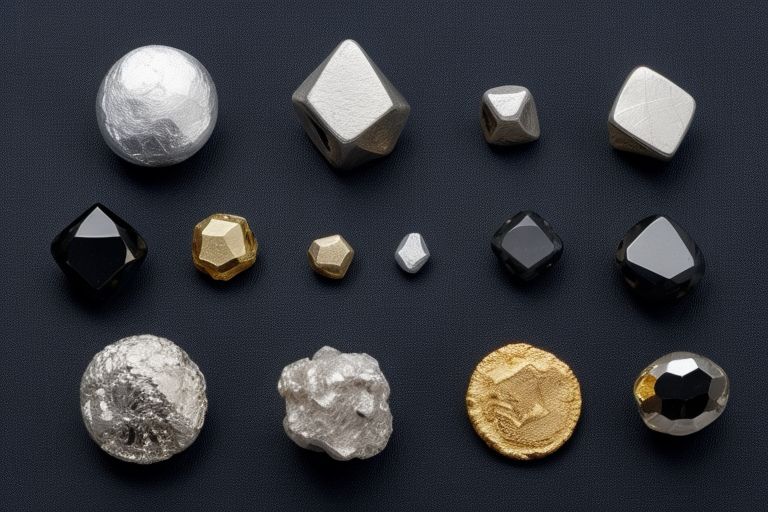Our Services – Precious Metal Recovery
Discover our comprehensive services for precious metal recycling, including advanced methods for recovering them.
Gold Recovery
At Onyx Metals, we offer specialized services for the efficient and sustainable recovery of gold from various sources, including old jewelry and industrial waste. Our advanced recovery methods ensure maximum yield of high-purity gold while maintaining a strong commitment to environmental responsibility.
Cyanidation: We use advanced cyanidation processes to dissolve and extract gold from low-grade ores and electronic waste. This method allows us to efficiently separate gold from other components, ensuring high recovery rates.
Electrowinning: To enhance gold recovery from solutions generated during cyanidation, we employ electrowinning. This electrochemical process deposits gold onto electrodes, resulting in high-purity metal. Our state-of-the-art electrowinning systems ensure optimal efficiency and minimal loss.
Smelting: For complex materials containing gold along with other metals, our high-temperature smelting services are ideal. We use fluxes to facilitate the separation of gold from impurities, producing high-quality gold ingots ready for further refining.
Silver Recovery
We pride ourselves on offering efficient and sustainable silver recovery services from a variety of sources, including photographic materials and industrial waste. Our methods are designed to maximize the yield of high-purity silver while upholding our dedication to environmental responsibility.
Hydrometallurgical Processes: We employ hydrometallurgical methods such as acid leaching to dissolve and extract silver from photographic materials. This process allows us to efficiently separate silver from other components, ensuring high recovery rates.
Fire Assaying: For silver recovery from ores and concentrates, we use traditional fire assaying methods. This involves melting the material in a furnace with fluxes that help separate silver from other elements, producing high-quality silver ready for further refinin.
Electrolytic Refining: To achieve high-purity silver, we employ electrolytic refining. This process uses an electric current to deposit silver onto cathodes, ensuring optimal efficiency and minimal loss.
Platinum Recovery
We excel in the recovery of platinum from a variety of sources, including catalytic converters, industrial scrap, and jewelry waste. Our state-of-the-art recovery methods ensure that we extract high-purity platinum efficiently while adhering to strict environmental standards.
Aqua Regia Processing: We employ aqua regia, a mixture of nitric acid and hydrochloric acid, to dissolve and extract platinum from various sources. This process allows us to effectively separate platinum from other metals and contaminants, ensuring high recovery rates.
Electrolytic Refining: To achieve the highest purity levels, we use electrolytic refining. This method involves passing an electric current through a platinum solution, which causes platinum to deposit onto electrodes. Our advanced electrolytic systems ensure optimal efficiency and minimal loss.
High-Temperature Smelting: For complex materials containing platinum along with other metals, our high-temperature smelting services are ideal. By adding specific fluxes, we can facilitate the separation of platinum from impurities, producing high-quality platinum ingots ready for further refining.
Ruthenium Recovery
We specialize in the intricate recovery of ruthenium from diverse sources such as electronic components, industrial catalysts, and chemical processing residues. Our advanced recovery techniques are designed to ensure the highest yield of pure ruthenium, maintaining our commitment to environmental sustainability.
Chemical Leaching: We employ specialized chemical leaching processes to dissolve and extract ruthenium from various sources. This method allows for efficient separation of ruthenium from other metals and impurities, ensuring high recovery rates.
Ion Exchange: To enhance the purity of recovered ruthenium, we use ion exchange techniques. This process involves passing the dissolved ruthenium solution through ion exchange resins, which selectively capture ruthenium ions, resulting in a highly purified product.
High-Temperature Processing: For materials containing ruthenium in combination with other elements, our high-temperature processing services are ideal. We use specific fluxes and controlled furnace conditions to separate ruthenium from impurities, producing high-quality ruthenium ready for further refining.
Rhodium Recovery
We focus on the precise and efficient recovery of rhodium from a range of sources, including automotive catalytic converters, industrial catalysts, and specialized electronic components. Our specialized recovery methods are designed to maximize the yield of high-purity rhodium while adhering to our rigorous environmental and quality standards.
Solvent Extraction: We use solvent extraction techniques to selectively separate and recover rhodium from complex mixtures. This method involves dissolving the rhodium in a solvent and then separating it from other components through chemical reactions, ensuring high purity and efficiency.
Hydrometallurgical Processing: Our hydrometallurgical processes involve treating rhodium-containing materials with aqueous solutions to dissolve and extract the metal. This method allows for precise control over the recovery process, ensuring maximum yield of rhodium.
High-Temperature Smelting: For materials with combined rhodium and other metals, we employ high-temperature smelting. By using specific fluxes and maintaining controlled furnace conditions, we separate rhodium from impurities, producing high-quality rhodium ready for further processing.
Palladium Recovery
We offer expert services for the recovery of palladium from a variety of sources, including automotive catalytic converters, electronic devices, and industrial by-products. Our sophisticated recovery methods are tailored to maximize the yield of high-purity palladium, ensuring both efficiency and environmental sustainability.
Chemical Leaching: We use chemical leaching processes to extract palladium from various sources. This method involves dissolving the palladium-containing materials in chemical solutions to separate the metal from other components, achieving high recovery rates.
Selective Precipitation: To further purify palladium, we employ selective precipitation techniques. This process involves adding specific reagents to the solution that cause palladium to precipitate out, allowing for precise separation and high purity
Electrolytic Refining: Our electrolytic refining processes are used to enhance the purity of recovered palladium. By applying an electric current to a palladium solution, we deposit pure palladium onto electrodes, ensuring optimal recovery and minimal loss.
Iridium Recovery
At Onyx Metals, we are dedicated to the specialized recovery of iridium from diverse sources such as high-tech industrial equipment, chemical catalysts, and scientific instruments. Our advanced recovery techniques are designed to efficiently extract iridium with the utmost precision, ensuring both high purity and environmental sustainability.
Acid Leaching: We use acid leaching methods to dissolve and recover iridium from complex materials. This technique involves treating the iridium-containing materials with strong acids to separate the metal from other components, ensuring effective and efficient extraction.
Solvent Extraction: To further purify the recovered iridium, we employ solvent extraction processes. This method involves using selective solvents to separate iridium from a mixture, resulting in high-purity iridium that meets industry standards.
High-Temperature Processing: For iridium-containing materials with multiple metals, our high-temperature processing services are ideal. We use controlled furnace conditions and specific fluxes to separate iridium from impurities, producing high-quality iridium ready for further refinement.
To gain a deeper understanding of how we manage and execute our recycling processes and discover the innovative techniques and technologies we use to transform materials into valuable resources

